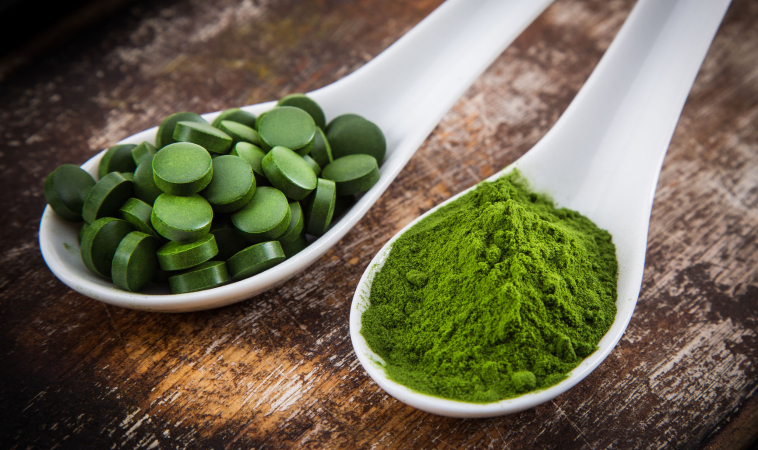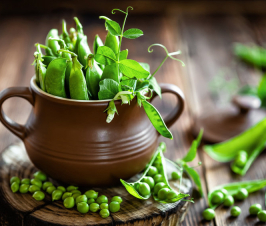Spirulina, or “blue-green algae,” is commonly considered a “superfood” due to its myriad of health properties. The food is actually a special kind of bacteria called a cyanobacterium – Arthrospira platensis – that has the unique ability to photosynthesize, just like plants. It has been used as a food source by various cultures for thousands of years, including the Aztecs.
Current research found an extract from spirulina that may cause vasodilation
Current research from the Vascular Physiopathology Laboratory of the I.R.C.C.S. Neuromed in Pozzilli, Italy has found an extract from spirulina that may cause vasodilation and help treat arterial hypertension.1
Researchers isolated a peptide from spirulina capable of dilating arteries
Researchers from the University of Salerno, Sapienza University of Rome and Federico II University of Naples isolated a peptide from spirulina that is capable of dilating arteries. The dilation of arteries is the mechanism of an antihypertensive effect. The effect of the peptide has been tested on isolated arteries and animal models.
Gastrointestinal digestion on the raw extract of spirulina
“Our research started by conducting simulated gastrointestinal digestion on the raw extract of spirulina. In other words, we reproduced what happens in the human gut after ingesting the substance. This way we have been able to isolate the peptides that would be absorbed by our body, “says Albino Carrizzo, first author of the paper.
Peptide, SP6, identified for the first time
The peptide, SP6, has been identified for the first time. When it was introduced to isolated blood vessels it showed significant vasodilatory effects. It was then given to hypertensive animals with a significant result of lowering blood pressure.
What we know now
“We know,”says Carmine Vecchione, Professor at the University of Salerno and head of Vascular Physiopathology Laboratory at Neuromed Institute, “that hypertensive patients often have a defect in the natural processes that, by the action of nitric oxide, regulate endothelium. The peptide we isolated in spirulina extract acts positively on this mechanism. Of course, further researches will be necessary, but we think that SP6 could be a natural adjuvant to common pharmacological therapies in order to improve endothelial function and, consequently, combat hypertension.”
Source:
- Carrizzo A, Conte GM, Sommella E, et al. Novel Potent Decameric Peptide of Spirulina platensis Reduces Blood Pressure Levels Through a PI3K/AKT/eNOS-Dependent Mechanism. Hypertension. 2018;:HYPERTENSIONAHA11811801.
 Razi Berry is the founder and publisher of the journal Naturopathic Doctor News & Review that has been in print since 2005 and the premier consumer-faced website of naturopathic medicine, NaturalPath. She is the host of The Natural Cancer Prevention Summit and The Heart Revolution-Heal, Empower and Follow Your Heart, and the popular 10 week Sugar Free Summer program. From a near death experience as a young girl that healed her failing heart, to later overcoming infertility and Chronic Fatigue Syndrome and Fibromyalgia through naturopathic medicine, Razi has lived the mind/body healing paradigm. Her projects uniquely capture the tradition and philosophy of naturopathy: The healing power of nature, the vital life force in every living thing and the undeniable role that science and mind/body medicine have in creating health and overcoming dis-ease. Follow Razi on Facebook at Razi Berry and join us at Love is Medicine to explore the convergence of love and health.
Razi Berry is the founder and publisher of the journal Naturopathic Doctor News & Review that has been in print since 2005 and the premier consumer-faced website of naturopathic medicine, NaturalPath. She is the host of The Natural Cancer Prevention Summit and The Heart Revolution-Heal, Empower and Follow Your Heart, and the popular 10 week Sugar Free Summer program. From a near death experience as a young girl that healed her failing heart, to later overcoming infertility and Chronic Fatigue Syndrome and Fibromyalgia through naturopathic medicine, Razi has lived the mind/body healing paradigm. Her projects uniquely capture the tradition and philosophy of naturopathy: The healing power of nature, the vital life force in every living thing and the undeniable role that science and mind/body medicine have in creating health and overcoming dis-ease. Follow Razi on Facebook at Razi Berry and join us at Love is Medicine to explore the convergence of love and health.

















